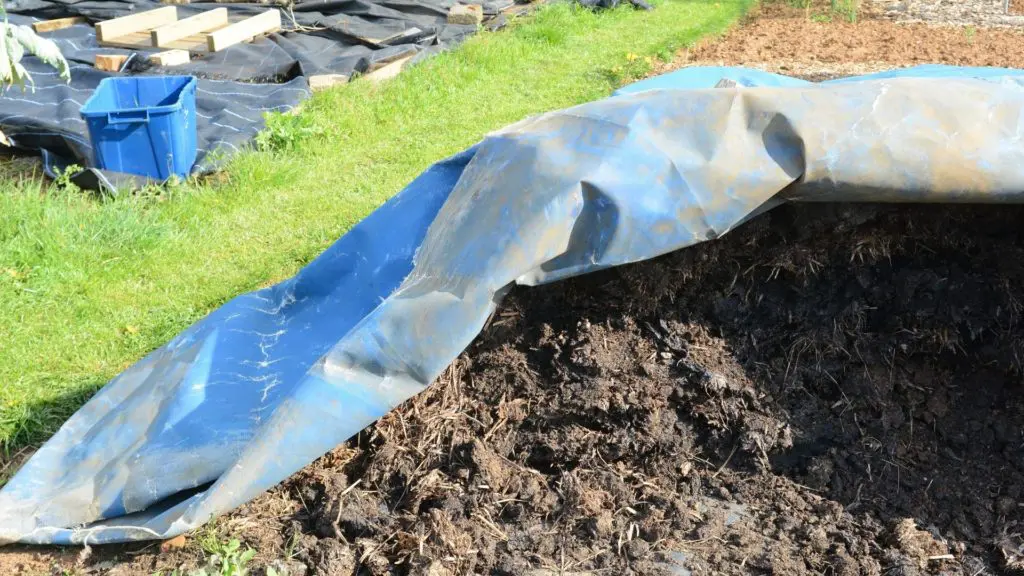Last updated: June 11, 2021
A landscaper hauls away our manure pile every couple of months. My neighbor asked me what his charges were for the service and was surprised to learn that he does it for free because he uses the manure and shavings in gardens as a fertilizer.
Horse manure makes for an excellent fertilizer for gardens, coming at an affordable price and providing essential nutrients to plants. Horse manure not only provides the nutrients necessary to feed plants but also gives them a little extra push when they’re just starting out.
Horse manure is a nuisance to many, but it’s free fertilizer for those with a garden, but it needs to be composted first. Read on to learn how to prepare and use horse manure to enrich your gardening soil.

Horse manure is good for the gardens.
Did you know that horse manure is good for gardens? It’s true! Horse manure is a natural fertilizer, and it’s available in most areas where horses are kept. When used correctly, it can be an effective way to fertilize your garden without using substances that may harm the environment.
Horse manure is a nitrogen-rich fertilizer that you can use to help plants grow. It’s also an excellent way to get rid of excess animal waste, so it’s environmentally friendly in the sense that it repurposes animal waste and doesn’t introduce harmful chemicals into the ground.
What does horse manure do to the soil?
Adding animal manure to your garden soil promotes healthy growth and fertility in your garden. It is a natural, organic source for nitrogen, phosphorous, and potassium, which are primary nutrients required by plants to thrive.
The addition of this material also helps with mulching your beds, improving water retention, and loosening up hard-packed subsoil that can inhibit root development.
The types of horse manure vary depending on what you fed your animal and how they are kept. Manure from stall kept horses is mixed with organic bedding material and affects its moisture content. Horse barns that feed rich hay produce different manure varieties than horses that graze outside in grass pastures.
When you feed horses grain, they produce more phosphorous in their manure. The difference is most noticeable when the manure is raw. In general, people should compost horse manure before using it.
When should I put horse manure on my garden?
Horse manure is an excellent way to add nutrients back into your soil naturally and should be added in the fall or spring. You’ll want to wait until all vegetables have been harvested before you add fresh manure or side-dress with horse manure compost during the growing season.
One of the things you should do when planting a garden is adding manure compost. It gives your plants the nutrients they need to grow. Put it in 60 days before you harvest so that your soil has time to absorb all of the nutrients in it before your plants mature. If you have a place with poor soil, add fertilizer as well.
Plants that do well fertilized with horse manure.
Some plants, like roses, will grow well with fresh manure, but most other plants may not do well with it at all. The disadvantage of using fresh horse manure is that it can be too alkaline and could burn the roots of some plants.
On the other hand, most plants grow well in soil mixed with composted horse manure. Composted manure is better than fresh, and you can incorporate it into your garden before you plant them in spring.
For example, tomatoes seem to grow best in rich soil boosted by composted horse manure mixed into the ground. Composted horse manure is a natural fertilizer for the tomato plant, and it also improves the composition of the soil.

Is horse manure better than cow manure?
Cow manure is usually wetter. Horse manure is dryer. But they are both excellent for your plants. Some people suggest that horse manure is better for moist soils, but I doubt the amount of liquid in the manure matters because it won’t really affect the soil nutrient content.
However, a study conducted by the University of Illinois found that manure from horses was more effective at fertilizing than cow manure in a controlled experiment with corn and soybeans.
Horse feces contain more nitrogen, phosphorus, potassium, and calcium than many other types of animal waste, making it an excellent fertilizer for crops.
Composting horse manure.
The smell of horse manure in the air may not sound like a pleasant scent, but it actually plays an essential role in the environment. The waste that horses and other animals produce has high nitrogen levels, which makes it a great fertilizer for plants! Composting is one way to make sure this natural resource doesn’t go to waste.
Composting horse manure is a great way to eliminate waste and create a healthy soil amendment. It can take up to six months for horse manure to break down, but this natural process will produce an excellent fertilizer when it does.
Why compost horse manure?
Composting reduces the size of manure piles and kills parasites, eggs, larvae, and weed seeds that could be harmful to your garden and would otherwise grow if fresh manure is used.
As a horse owner you likely have a large manure pile if you want your manure to decompose faster than normal, then it’s important that you compost. When it comes to producing compost, the correct technique is essential. Manure left on its own to decompose could take months or even years to do so if left untouched.

How to compost horse manure.
Horse manure can be composted using the same methods that you might use with any other type of household waste, such as food scraps, just on a bigger scale. Depending on the amount you plan to compost, the process does not require special tools or structures; just one shovel will do!
However, for most horse owners having a tractor with a front-end loader is ideal. Compost piles are easily created in free-standing heaps and should be kept covered and away from your house and barn. They are combustible.
You also want to keep the pile moist and regularly turn it with a pitchfork or use your tractor to turn it to allow air in; this process generates heat and helps the manure decompose quickly into nutrient-rich compost that you can use around plants.
When a manure heap undergoes correct composting techniques such as turning or tilling-these tasks help speed up the process of natural decay by aerating material with oxygen, among other things-within months, you’ll have usable fertilizer for your plants!
How long does it take for horse manure to compost?
A well-managed compost should be ready in three months, but remember that it will depend on the temperature and how well you work your manure pile. The best way to check whether the compost is ready is to look at it; you’ll know it’s composted when the material appears evenly textured and looks dark and crumbly, and has a fresh earthy scent.
FAQ
How do you know if horse manure is composted?
You’ll know the composting process is complete, when your pile shrinks down to about half its size and is no longer hot. The composted manure will smell like soil and have a consistent texture.
Does horse manure attract disease?
It’s not always the most pleasant discovery to come across a pile of horse manure, but it doesn’t pose any threats for humans. Most of the harmful bacteria in horse manure dies in sunlight.
Does horse manure attract rats?
Manure piles are a breeding ground for several species of flies and can also become the perfect nesting site for rats. However, compost piles correctly managed don’t attract rats.
Conclusion
Composted horse manure is an excellent resource for providing nutrients, and as a soil builder, it’s highly valued by gardeners and easy to give away. Gardens that use composted horse manure typically grow healthier plants than those without it.
Composting allows you to put your horses who waste to good use: fertilizing some hardworking gardens around your area acting as excellent fertilizer—all without adding any chemicals whatsoever to our soils or water supply!
Meet Miles Henry
An avid equestrian and seasoned racehorse owner, Miles Henry brings his extensive experience to the equine world, proudly associating with the AQHA, The Jockey Club, and various other equine organizations. Beyond the racetrack, Miles is an accomplished author, having published various books about horses, and is a recognized authority in the field, with his work cited in multiple publications.
🔗 Connect with Miles:
Twitter
Facebook
YouTube: Check out race highlights, horse care tips, and more!

